Blog-Versary Author Post: Depression and Writing, Jacqueline Rohrbach

Today we have Jacqueline Rohrbach joining us with a blog anniversary author post. The subject is depression; Depression and Writing. Jacqueline asked me to let her know if I thought the topic/the post was too heavy but I think it’s relevant, powerful and brave. Depression is something many people relate to or understand on a number of levels. Whether that’s having personal difficulties to overcome in life. Maybe having co-existing anxiety, maybe generalised or specific depression. Perhaps having had suicide ideation. You may have a loved one who has been dealing with their own depression. Given that 1 in 5 people will be suffering depression at any point – and I believe that figure to be conservative – the more we talk about these personal experiences, the less stigma there is attached.
Writing is an industry that can be solitary. Sure you can talk to people online, but it can still be isolating, particularly if you are already prone to bouts of depression. It also can’t be easy opening yourself up to being critiqued, whether that be by reviewers, fellow authors, or people in general. I want to thank Jackee Rohrbach for being so open and honest in this post. If it resonates with you I hope you will feel more able to reach out to someone who can help. To talk to someone you feel comfortable with. Also, if you’ve been putting off writing that book, that play, that script, that project, perhaps because you are fearful, I hope that Jackee’s experiences outlined here encourage you to take that positive fist step toward actually doing it.
(I have included some international suicide prevention hotlines at the end of this post. They are current as of mid 2017 but they are only a guide and not meant as a recommendation.)
.
Depression and Writing.
Kazza’s review was one of the first of my book, The Worst Werewolf, and On Top Down Under served as my first introduction to the world of book blogs. I’ve always been an avid reader of all types of fiction and nonfiction, but I never saw reading as a form of socializing. The opposite. Books were actually an excellent way to avoid the eye contact I didn’t want to make anyway. Okay, I’m really introverted. Like I score 100% on introversion when I take those typology tests.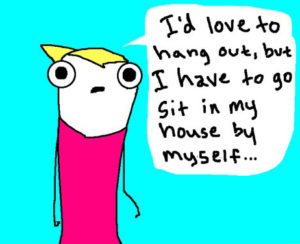
For this reason, one of the things that struck me first about the blog was its origin story. Two people coming together to create something new because they loved the same book is pretty flippin’ sweet and testifies to the power of writing. I’m glad the bond took them up to now, and I enjoy reading their reviews.
When Kazza asked me to do a guest post for the five-year anniversary of On Top Down Under, my first reaction was why me? Of course I felt honored, humbled, excited, and delighted. Above all else, though, I felt unworthy. I literally just read my last sentence and thought, “There’s a good reason why. You’re pathologically uncool and everyone who reads this will know it.” Which is true. I am pretty much a tragic hybrid of Mister Smithers, Hank Hill, and Tina Belcher.
This same self-doubt, linked with depression, is what this blog post is about. Why? Well, I hope it reaches one or two people who struggle with similar issues, and I hope they find comfort in knowing they’re not alone.
So if you’re reading this and you’re also pathologically uncool, welcome to the club.
Now to the blog post. Keep going strong, On Top Down Under and happy fifth anniversary!
There’s no one right way to deal with depression anymore than there is one way to write.
(**Post trigger warnings: suicide, abuse, self-doubt, and anxiety**)
People often assume their solutions are generalizable to others and that the way they managed their depression is how everyone else should, too.
I don’t assume this to be true.
Whatever I say could be wrong for you: my experiences might not come remotely close to anything you’ve gone through, my feelings might not mirror your own, my suggestions might actually cause you more anxiety. Take all advice, including mine, with a grain of salt, and do what works best for you.
The same goes for writing advice. Don’t mistake the preferences of others (or your own) for bright-line rules. For me, that did nothing but add to the anxiety and stress.
Join an online community
Before I joined Twitter, I had an image of writers. I saw them as these confident, intellectually insightful people who knew big words and spent their time feeling awesome about themselves and their work. They’re brilliant, quick, clever, and always ready with a snappy comeback.
I’m not any of those things. Seriously, ask me to say “rural”; I’m like a dog with peanut butter stuck to the roof of its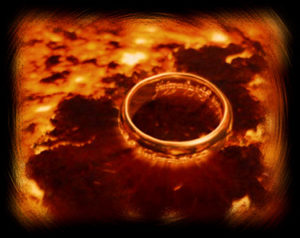 mouth. I’m terrified of the most nonsensical things, like paying my garbage bill. I’m a night owl primarily because I see other people and social situations as continual opportunities to make an idiot out of myself. Tell me to choose between journeying to Mordor to destroy the one true ring or the going to the grocery store, and I’d ask you if the hobbits were mandatory.
mouth. I’m terrified of the most nonsensical things, like paying my garbage bill. I’m a night owl primarily because I see other people and social situations as continual opportunities to make an idiot out of myself. Tell me to choose between journeying to Mordor to destroy the one true ring or the going to the grocery store, and I’d ask you if the hobbits were mandatory.
There isn’t a day in my life when I don’t feel like a total loser.
I wouldn’t say it’s “nice” to see others struggle with similar issues, but it does offer an odd sort of comfort to know I’m not the only one who’s terrified of making a simple phone call. You can interact based on your own comfort level or sit back and observe. You’ll find most people are supportive and understand what you’re going through.
Don’t let anyone convince you treatment is wrong
This is where you’ll want to skip if you’re easily triggered by discussion of suicidal thoughts and attempts, you’ll want to skip on to the next section.
I’m alive today because I was too socially anxious to get a gun. That’s really the only reason. This surprises people, and I’ll always get some response like, “But you’re so strong.”
They’re right. I am strong. It’s one of the few positive things I’ll say about myself without any hesitation. Growing up, I was raped, beaten, bullied, neglected, and a whole bunch of other bad shit. Despite it, I managed to keep my grades up and my outlook somewhat positive. I carried myself through a hellish childhood. It’s also at this point people want to say, “What about your family?” Let me repeat: I carried myself.
I refused to seek treatment when the depression came thinking it was a strength game. I remember going to my father about it, and his reply was, “I just don’t understand that mentality. I don’t understand wanting to kill yourself.” Or when I tried to express anxiety and hurt over the bullying of my peers, “What are you going to do if they tell you you’re a squirrel? Are you going to get down on the ground and start gathering nuts?”
At the time, this seemed like sage advice. Other people couldn’t determine who I was. That was my job. Unfortunately, the depression and anxiety didn’t go away no matter how many times I told myself what my father said was logical and true. I continued to be afraid to go into the store. And I hurt myself. Whenever I thought I’d failed in some way, no matter how small, I hurt myself.
Years later, after an endless cycle of highs and low lows, I drove to Walmart and sat in the parking lot trying to work up the courage to go inside and buy a gun. The only thing keeping me from it wasn’t my strength. It was my anxiety. I didn’t know what I’d say if they asked questions. I knew I’d start to cry. It wasn’t until I treated my depression like an illness that I started to feel better.
Please don’t let anyone tell you your depression is a personal failing. Get the help you need. Take the medications you need to take. You’re not weak. Depressed people are some of the strongest, most resilient people I know. You’re also not defective. You’re human.
Don’t be too hard on yourself
Here’s where I’m a massive hypocrite. My definition of “failure” is broad, and I’m quick to say my shortcomings are due to my defects as a human being, which are numerous and unforgivable. And that’s me taking it easy.
This is not healthy behavior. Don’t be like me!
As I said before, seeing others struggle with similar issues and overcome helps to a certain extent. One of the things I’m working up the courage to do is to share my work more often on social media. Events like #1linewed terrify me. I’ve also made a “let others tell you no” resolution. Simply put, I submit my work wherever I’d want it to be published, even if I think I have zero chance of ever being accepted.
I’ll get rejected. You will too if you decide to pursue publishing. The more you do it, the easier it gets. I encourage you to take chances on yourself. Depression causes us to fixate on how we’re not good enough. Don’t let it steal away your opportunities!
Don’t compare yourself to others
It’s extra harmful to engage in ranking games while depressed. In my case, I told myself everyone else’s writing 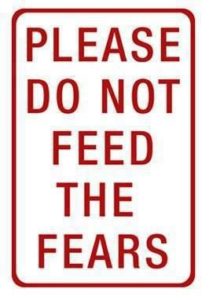 outshined mine, and I’d never be published for that reason. This caused me to delete my early attempts, and triggered one or two episodes.
outshined mine, and I’d never be published for that reason. This caused me to delete my early attempts, and triggered one or two episodes.
The reverse—believing you’re great and everyone else sucks—is equally harmful, especially when the rejection letters start to come. Bottom line: time spent worrying about the deservedness of your fellow writers is time better spent writing. The people you’re envious of received their fair share of rejection, too.
What do I suggest instead of comparing yourself to others? Be glad when someone accomplishes her/his goals- congratulate, cheer, encourage – and focus on your own work. Refine and develop your own voice. Write, write, write.
Stop if you need to
Some people write very well while depressed. That wasn’t me.
Seven years ago, I told myself I’d never write another story, let alone a novel. I convinced myself I was creative only while manic, and—as a result—developed a pattern of destructive behavior around my process. And so I stopped to focus on getting well.
There were a few who said I’d let depression “beat” me, that I was a “quitter.” There were others who said I let depression make me a half person. They said I could fully function in my life with my mental illness. Perhaps this was true for them. It wasn’t for me.
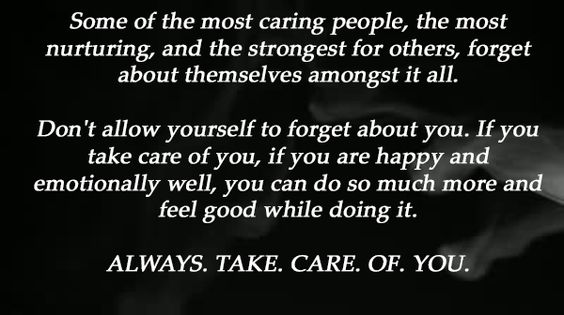
It doesn’t have to be you either. You’re not half a person if you need to stop writing. You’re not weak. You’re not a quitter. You’re ill and you need treatment. Anyone who tells you otherwise, especially after you communicate your needs, doesn’t have your best interests at heart or they don’t understand the seriousness of the illness.
That’s not to say you wont have to put effort into your treatment. You will. Often times, it may even feel like a slugfest where you’re just constantly getting hit and have to somehow stand back up again. Much like writing itself, it’s a painful process that involves a lot of failure, heartache, and restarting.
Don’t let others convince you to prioritize appearing “strong” over surviving and self-care. Walk away from writing if you need to.
Come back when you can
My Twitter feed is often filled with stories of depressed people who found their way back to writing. I’m one of them. You can be, too.
Like I said, seven years ago, I told myself I wouldn’t write a book. Depressed me saw it as a measure of my worth—the one thing I could do right. And if people rejected that, well, they rejected me.
The relatively-stable me understands there’s a value to writing beyond the money or praise it earns. Those things are important, especially for those hoping to make a career from their talent, but—generally speaking—even the most hardcore money-driven writers on my feed express a love for writing that goes beyond its commercial value. They take risks on projects they love. They take career risks in order to write more. They take risks on themselves. The vast majority of them have expressed, at one time or another, that they struggled with depression, anxiety, or continual self doubt.
No doubt it’s a part of you in the same way, and the chances are good you won’t have to leave it behind for the rest of your life either. No matter where your struggles take you, know I’m cheering for you.
Author Bio:
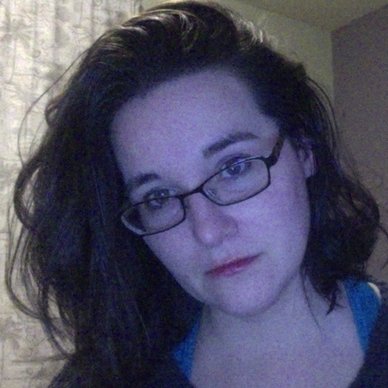 Jacqueline Rohrbach is a 36-year-old creative writer living in windy central Washington. When she isn’t writing strange books about bloodsucking magical werewolves, she’s baking sweets, or walking her two dogs, Nibbler and Mulder. She also loves cheesy ghost shows, especially when the hosts call out the ghost out like he wants to brawl with it in a bar. You know, “Come out here, you coward! You like to haunt little kids. Haunt me!” Jackee laughs at this EVERY time.
Jacqueline Rohrbach is a 36-year-old creative writer living in windy central Washington. When she isn’t writing strange books about bloodsucking magical werewolves, she’s baking sweets, or walking her two dogs, Nibbler and Mulder. She also loves cheesy ghost shows, especially when the hosts call out the ghost out like he wants to brawl with it in a bar. You know, “Come out here, you coward! You like to haunt little kids. Haunt me!” Jackee laughs at this EVERY time.
She’s also a hopeless World of Warcraft addict. In her heyday, she was a top parsing disc priest. She became a paladin to fight Deathwing, she went back to a priest to cuddle pandas, and then she went to a shaman because I guess she thought it would be fun to spend an entire expansion underpowered and frustrated. Boomchicken for Legion!
Contacts:
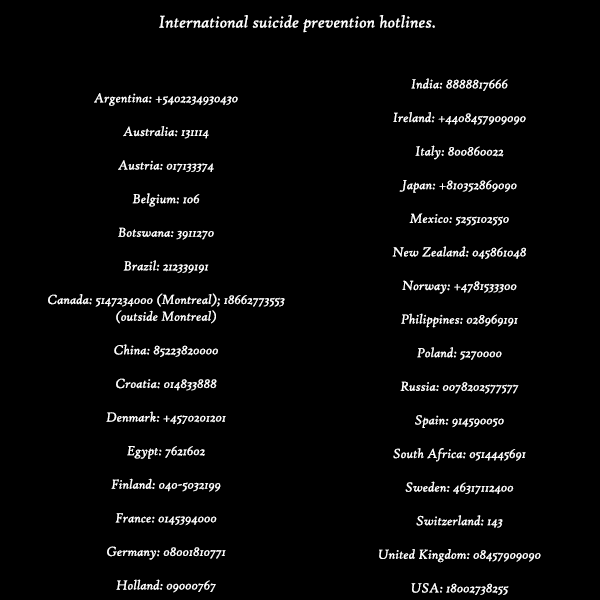

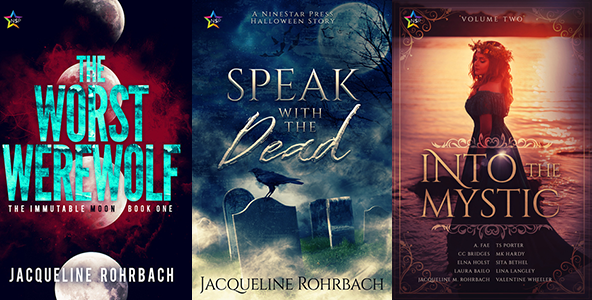
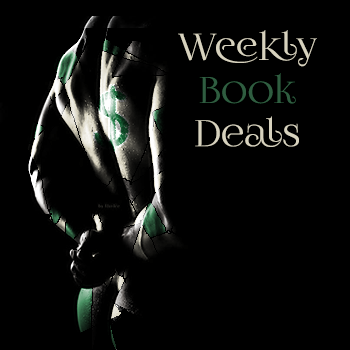
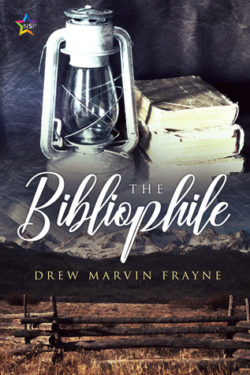

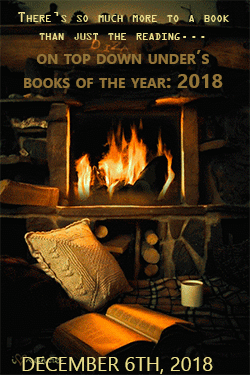

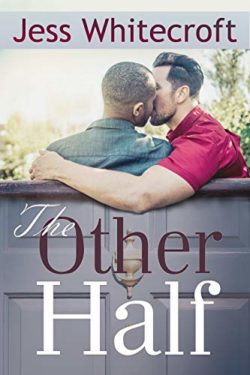


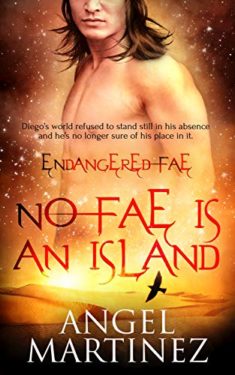
Ohmigod!! I have to collect myself after reading this post. I’m feeling some deja vu. Checking mascara. Ok. It’s all good. 😀 I’m at a great place in my life now but depression and anxiety and me go waaaay back. It kicked my butt in my teens and I was on 24 hour suicide watch by my family. Truth, it kinda went even further back than my teens, and I had the best fam-bam ever. I have some hard wiring issues, who doesn’t though, right? But I’m SO good now. Happy. I hope lots of people get a positive message… Read more »
Thank you, Lee. I’m very grateful you had the family support you needed to help you through your tough years. You brought up a point I neglected to mention: depression doesn’t discriminate. You can have the best fam-bam and still be depressed. A lot of people tend to think it only hits people who are isolated socially, and that just isn’t true. The dinosaur bling story is actually on my to-do list. It might take a bit for me to get to it (still working on the second book in the Immutable Moon), but I plan on writing it. And… Read more »
Thank you, Jacqueline, for this post. I lost two sisters as a result of depression. What ultimately took them away were their addictions. I believe that those addictions wouldn’t have been there had they been able to get the help they desperately needed for their depression. It wasn’t there so they turned to their drug or drink of choice to make it go away for a little while. I’m a firm believer in seeking help and I applaud you.
Hi, Cindi. Thank you for the kind words. Self-medication through drugs and alcohol is another very serious issue surrounding depression and the stigma of seeking treatment. I’m very sorry to hear about your sisters. I know how difficult it is to lose a loved one to depression. My brother killed himself a year before he graduated high school. He was quite abusive toward the end, but I often wondered the shift in personality was due to mental illness. It’s been a hard road to forgiveness.
Thank you for the post. I’ve had those types of thought for a long time and sometimes it hits me really hard still. I appreciate you bring attention to it and addressing it in the post.
This is one of the most brutally honest posts we’ve had on the blog and once I read the post I knew it had to be included. That it’s part of our blog anniversary is even more special. I have never made a secret of my career. I’ve worked with depressed, anxious and suicidal people, amongst other areas. Seeking help is important when you feel depressed. Look for sites that list the signs of depression if you want some extra confirmation because some of the signs of depression are not always what people expect. There are good therapists out there… Read more »
Kazza, thanks for allowing me to post my thoughts, and thank you for the important work you do. It’s always difficult for me to see others struggling and not knowing how to help. Socializing with other people has never been a strength of mine. Sadly, I’m much better at dealing with confrontation that I am at any other type of positive interaction. I especially connected with your discussion of how depression is often invisible to others. I had so many “friends” make fun of me for being a real life Debby Downer. Mine was especially bad because I really started… Read more »